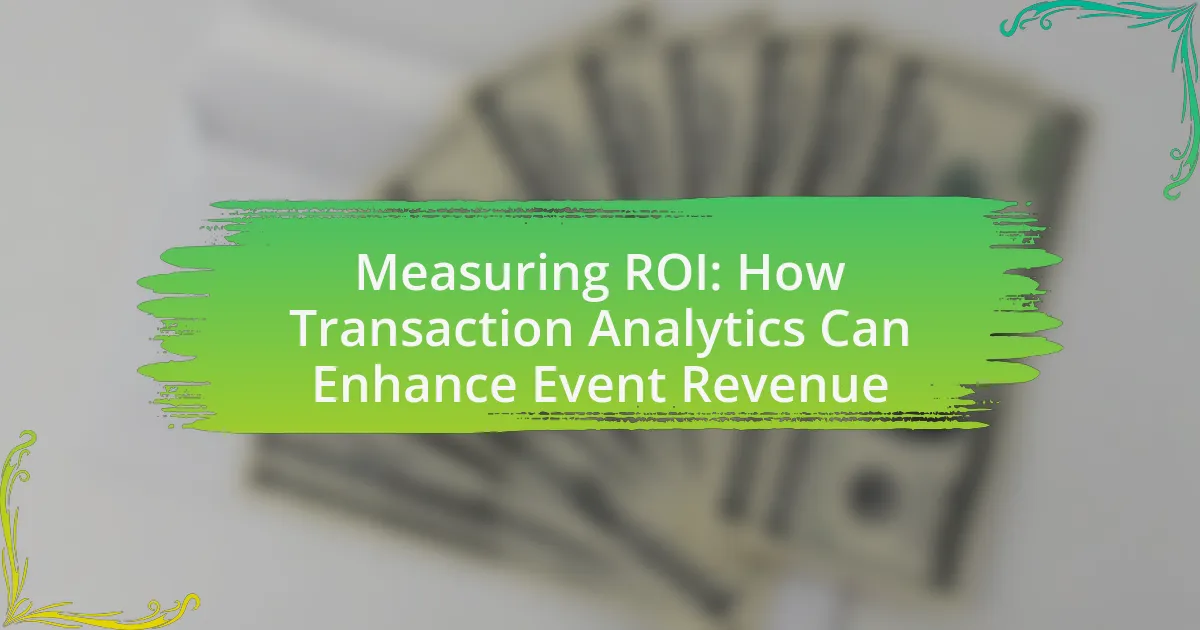Data compliance in event payment processing is essential for safeguarding sensitive financial information and ensuring adherence to legal regulations. This article examines the significance of compliance with standards such as the Payment Card Industry Data Security Standard (PCI DSS) and the General Data Protection Regulation (GDPR), highlighting the risks associated with non-compliance, including financial penalties and reputational damage. It also discusses the critical security measures necessary for maintaining compliance, such as encryption, access controls, and regular audits, while emphasizing the importance of building customer trust through transparent data protection practices. Additionally, the article outlines best practices and strategies organizations can implement to achieve and sustain data compliance effectively.
What is the Importance of Data Compliance in Event Payment Processing?

Data compliance in event payment processing is crucial for protecting sensitive financial information and ensuring legal adherence. It safeguards customer data against breaches, which can lead to financial loss and reputational damage for organizations. Compliance with regulations such as the Payment Card Industry Data Security Standard (PCI DSS) mandates strict security measures, including encryption and access controls, to mitigate risks associated with payment transactions. Non-compliance can result in severe penalties, including fines and loss of business licenses, highlighting the necessity for organizations to prioritize data compliance in their payment processing systems.
Why is data compliance critical in the context of event payment processing?
Data compliance is critical in the context of event payment processing because it ensures the protection of sensitive financial information and adherence to legal regulations. Compliance with standards such as the Payment Card Industry Data Security Standard (PCI DSS) mitigates the risk of data breaches, which can lead to significant financial losses and reputational damage for organizations. For instance, a study by Verizon found that 81% of data breaches are linked to compromised credentials, highlighting the importance of stringent data protection measures in payment processing. Additionally, non-compliance can result in hefty fines and legal repercussions, making adherence to data compliance not only a best practice but a necessity for maintaining trust and security in financial transactions.
What are the legal frameworks governing data compliance in payment processing?
The legal frameworks governing data compliance in payment processing include the General Data Protection Regulation (GDPR) in Europe, the Payment Card Industry Data Security Standard (PCI DSS), and the California Consumer Privacy Act (CCPA) in the United States. GDPR mandates strict data protection and privacy measures for personal data, requiring organizations to obtain explicit consent from individuals before processing their data. PCI DSS sets security standards for organizations that handle credit card information, ensuring that sensitive data is protected during transactions. CCPA provides California residents with rights regarding their personal information, including the right to know what data is collected and the right to request deletion of their data. These frameworks collectively establish the legal obligations for organizations involved in payment processing to protect consumer data and ensure compliance.
How does data compliance protect consumer information during events?
Data compliance protects consumer information during events by ensuring that organizations adhere to legal and regulatory standards for data handling and privacy. These regulations, such as the General Data Protection Regulation (GDPR) and the Payment Card Industry Data Security Standard (PCI DSS), mandate strict protocols for data collection, storage, and processing. Compliance with these standards minimizes the risk of data breaches and unauthorized access, thereby safeguarding sensitive consumer information. For instance, organizations that implement encryption and access controls as part of their compliance measures significantly reduce the likelihood of data theft during events, as evidenced by studies showing that compliant organizations experience fewer security incidents compared to non-compliant ones.
What are the potential risks of non-compliance in event payment processing?
The potential risks of non-compliance in event payment processing include financial penalties, legal repercussions, and damage to reputation. Financial penalties can arise from regulatory bodies imposing fines for violations of payment processing laws, such as the Payment Card Industry Data Security Standard (PCI DSS), which mandates strict security measures for handling cardholder data. Legal repercussions may involve lawsuits from affected customers or partners due to data breaches or mishandling of sensitive information. Additionally, damage to reputation can lead to loss of customer trust and decreased business opportunities, as consumers are increasingly aware of data security issues and may choose to avoid businesses that do not comply with regulations.
What financial penalties can arise from data compliance failures?
Financial penalties from data compliance failures can include substantial fines, legal fees, and compensation costs. For instance, under the General Data Protection Regulation (GDPR), organizations can face fines up to €20 million or 4% of their annual global turnover, whichever is higher, for non-compliance. Additionally, the Health Insurance Portability and Accountability Act (HIPAA) can impose fines ranging from $100 to $50,000 per violation, depending on the severity and nature of the breach. These penalties underscore the financial risks associated with inadequate data compliance in event payment processing.
How can non-compliance damage an organization’s reputation?
Non-compliance can severely damage an organization’s reputation by eroding trust among customers and stakeholders. When an organization fails to adhere to regulations, it risks public exposure of its shortcomings, leading to negative media coverage and public scrutiny. For instance, companies that have experienced data breaches due to non-compliance, such as Equifax, faced significant backlash, resulting in a loss of customer confidence and a decline in stock value. Furthermore, regulatory penalties and legal actions can amplify reputational harm, as seen in the case of Volkswagen, which suffered extensive reputational damage following its emissions scandal. This illustrates that non-compliance not only affects immediate financial standing but also long-term brand integrity and customer loyalty.
How does data compliance enhance security in event payment processing?

Data compliance enhances security in event payment processing by ensuring that organizations adhere to established regulations and standards, such as PCI DSS (Payment Card Industry Data Security Standard). Compliance mandates the implementation of robust security measures, including encryption, access controls, and regular security audits, which collectively protect sensitive payment information from breaches and unauthorized access. For instance, organizations that comply with PCI DSS are required to encrypt cardholder data during transmission and storage, significantly reducing the risk of data theft. This structured approach to data handling not only safeguards consumer information but also builds trust with customers, as they are more likely to engage with businesses that prioritize data security.
What security measures are essential for maintaining data compliance?
Essential security measures for maintaining data compliance include encryption, access controls, regular audits, and employee training. Encryption protects sensitive data by converting it into a secure format, making it unreadable without the proper decryption key. Access controls ensure that only authorized personnel can access sensitive information, reducing the risk of data breaches. Regular audits help organizations identify vulnerabilities and ensure compliance with relevant regulations, such as GDPR or PCI DSS. Employee training raises awareness about data protection practices and the importance of compliance, which is crucial for minimizing human error. These measures collectively enhance data security and compliance in event payment processing.
How do encryption and tokenization contribute to data security?
Encryption and tokenization significantly enhance data security by protecting sensitive information from unauthorized access. Encryption transforms data into an unreadable format using algorithms, ensuring that only authorized users with the correct decryption key can access the original information. For instance, the Advanced Encryption Standard (AES) is widely used to secure sensitive data, making it nearly impossible for attackers to decipher without the key.
Tokenization, on the other hand, replaces sensitive data with unique identification symbols or tokens that retain essential information without compromising security. This means that even if a data breach occurs, the exposed tokens cannot be used to retrieve the original sensitive data. According to the PCI Security Standards Council, tokenization can reduce the scope of compliance requirements for organizations handling payment data, thereby enhancing overall data security.
Together, encryption and tokenization create a robust framework for safeguarding sensitive information, making it a critical component of data compliance in event payment processing.
What role do access controls play in ensuring data compliance?
Access controls are essential in ensuring data compliance by regulating who can access sensitive information and under what conditions. They help organizations enforce policies that align with legal and regulatory requirements, such as the General Data Protection Regulation (GDPR) and the Payment Card Industry Data Security Standard (PCI DSS). By implementing role-based access controls, organizations can limit data access to authorized personnel only, thereby reducing the risk of data breaches and unauthorized disclosures. This structured approach not only protects sensitive data but also demonstrates compliance during audits, as it provides clear documentation of access permissions and user activities.
How does data compliance impact customer trust in event payment systems?
Data compliance significantly enhances customer trust in event payment systems by ensuring the protection of sensitive information. When payment systems adhere to regulations such as the General Data Protection Regulation (GDPR) and Payment Card Industry Data Security Standard (PCI DSS), they demonstrate a commitment to safeguarding customer data. This adherence not only minimizes the risk of data breaches but also fosters transparency and accountability, which are crucial for building trust. Research indicates that 79% of consumers are more likely to trust companies that comply with data protection regulations, highlighting the direct correlation between compliance and customer confidence in payment systems.
What are the benefits of building customer trust through compliance?
Building customer trust through compliance enhances customer loyalty and increases business reputation. When organizations adhere to regulations, they demonstrate a commitment to protecting customer data, which fosters confidence among consumers. According to a study by PwC, 85% of consumers will not do business with a company if they have concerns about its security practices. This statistic underscores the direct correlation between compliance and customer trust, as compliant businesses are perceived as more reliable and responsible. Furthermore, trust leads to higher customer retention rates, which can significantly reduce acquisition costs and drive long-term profitability.
How can organizations communicate their compliance efforts to customers?
Organizations can communicate their compliance efforts to customers by providing transparent information about their data protection policies and practices. This can be achieved through clear privacy notices, regular updates on compliance status, and accessible resources that explain how customer data is handled in accordance with regulations such as GDPR or CCPA. For instance, a survey by the International Association of Privacy Professionals found that 70% of consumers prefer companies that are transparent about their data practices, highlighting the importance of effective communication in building trust.
What are the best practices for ensuring data compliance in event payment processing?

The best practices for ensuring data compliance in event payment processing include implementing strong encryption methods, adhering to PCI DSS standards, conducting regular audits, and providing employee training on data protection. Strong encryption protects sensitive payment information during transmission, while PCI DSS compliance ensures that organizations meet security requirements for handling cardholder data. Regular audits help identify vulnerabilities and ensure adherence to compliance protocols. Employee training raises awareness about data protection policies and practices, reducing the risk of human error. These practices collectively enhance data security and compliance in payment processing.
What steps should organizations take to achieve data compliance?
Organizations should implement a structured approach to achieve data compliance by following specific steps. First, they must conduct a comprehensive data audit to identify what data they collect, store, and process, ensuring they understand their data landscape. Next, organizations should establish clear data governance policies that outline roles, responsibilities, and procedures for data handling, which is essential for maintaining compliance with regulations such as GDPR or CCPA.
Additionally, organizations need to invest in employee training programs to ensure that all staff members are aware of compliance requirements and best practices for data protection. Implementing robust security measures, including encryption and access controls, is crucial to safeguard sensitive data against breaches. Regularly reviewing and updating compliance policies in response to regulatory changes is also necessary to maintain adherence to evolving legal standards.
Finally, organizations should consider engaging with legal and compliance experts to conduct periodic assessments and audits, ensuring that their practices align with current regulations and industry standards. This structured approach not only helps in achieving data compliance but also mitigates risks associated with data breaches and non-compliance penalties.
How can regular audits and assessments improve compliance efforts?
Regular audits and assessments enhance compliance efforts by identifying gaps and weaknesses in existing processes. These evaluations provide organizations with a systematic approach to ensure adherence to regulatory requirements, thereby reducing the risk of non-compliance. For instance, a study by the Institute of Internal Auditors found that organizations conducting regular audits experienced a 30% decrease in compliance-related incidents. This demonstrates that consistent monitoring not only helps in maintaining compliance but also fosters a culture of accountability and continuous improvement within the organization.
What training is necessary for staff to understand data compliance requirements?
Staff must undergo training that covers data protection laws, such as the General Data Protection Regulation (GDPR) and the Payment Card Industry Data Security Standard (PCI DSS), to understand data compliance requirements. This training should include modules on data handling practices, privacy policies, and security protocols specific to payment processing. Additionally, practical workshops that simulate compliance scenarios can enhance understanding and retention of these critical concepts.
What tools and technologies can assist in maintaining data compliance?
Tools and technologies that assist in maintaining data compliance include data encryption software, compliance management platforms, and data loss prevention (DLP) solutions. Data encryption software secures sensitive information by converting it into a coded format, making it unreadable without the appropriate decryption key, which is essential for protecting personal data in payment processing. Compliance management platforms, such as OneTrust and TrustArc, help organizations track and manage compliance with regulations like GDPR and PCI DSS by providing frameworks for audits, assessments, and reporting. Data loss prevention solutions monitor and control data transfers to prevent unauthorized access or breaches, ensuring that sensitive payment information remains secure. These tools collectively enhance an organization’s ability to adhere to data compliance requirements effectively.
How can compliance management software streamline the compliance process?
Compliance management software can streamline the compliance process by automating tasks such as monitoring regulations, managing documentation, and tracking compliance activities. This automation reduces manual effort, minimizes human error, and ensures timely updates to compliance requirements. For instance, a study by the International Journal of Information Management found that organizations using compliance management software experienced a 30% reduction in compliance-related costs and a 40% decrease in the time spent on compliance tasks. This efficiency allows organizations to focus on core business activities while maintaining adherence to regulatory standards.
What role does data monitoring play in ensuring ongoing compliance?
Data monitoring plays a critical role in ensuring ongoing compliance by continuously tracking and analyzing data to identify any discrepancies or violations of regulatory standards. This proactive approach allows organizations to detect potential compliance issues in real-time, enabling timely corrective actions. For instance, regular audits and monitoring of transaction data can reveal patterns that may indicate fraud or non-compliance with payment processing regulations, such as PCI DSS. By maintaining a consistent oversight of data, organizations can not only adhere to legal requirements but also enhance their overall risk management strategies, thereby safeguarding their operations and reputation.
What are common challenges organizations face in achieving data compliance?
Organizations commonly face challenges such as complex regulatory requirements, lack of awareness or understanding of compliance obligations, and difficulties in data management when striving for data compliance. The complexity arises from the varying regulations across different jurisdictions, which can lead to confusion and inconsistent application of compliance measures. Additionally, many employees may not be adequately trained on compliance protocols, resulting in unintentional violations. Data management challenges include ensuring data accuracy, security, and proper documentation, which are critical for meeting compliance standards. These factors collectively hinder organizations’ ability to achieve and maintain data compliance effectively.
How can organizations overcome resource limitations in compliance efforts?
Organizations can overcome resource limitations in compliance efforts by leveraging technology and automation to streamline processes. Implementing compliance management software can reduce manual workloads, enhance accuracy, and ensure timely updates to regulatory changes. For instance, a study by Deloitte found that organizations using automated compliance solutions experienced a 30% reduction in compliance costs and improved efficiency in monitoring regulatory requirements. Additionally, organizations can prioritize compliance training for employees, fostering a culture of compliance that maximizes existing resources. By focusing on these strategies, organizations can effectively manage compliance without significant increases in resource allocation.
What strategies can be employed to keep up with evolving compliance regulations?
To keep up with evolving compliance regulations, organizations should implement a proactive compliance management system. This system includes regular training for employees on compliance updates, utilizing compliance software for real-time monitoring, and establishing a dedicated compliance team to oversee regulatory changes. Research indicates that companies with a structured compliance program are 50% less likely to experience regulatory violations, highlighting the effectiveness of these strategies.
What practical tips can organizations implement for effective data compliance?
Organizations can implement several practical tips for effective data compliance, including conducting regular audits, establishing clear data governance policies, and providing employee training on compliance requirements. Regular audits help identify gaps in compliance and ensure adherence to regulations such as GDPR or CCPA. Clear data governance policies outline roles and responsibilities, ensuring that data handling practices align with legal standards. Employee training raises awareness of compliance issues, reducing the risk of data breaches and enhancing overall data protection. According to a report by the Ponemon Institute, organizations that conduct regular training and audits experience 50% fewer data breaches, highlighting the effectiveness of these practices in maintaining data compliance.






